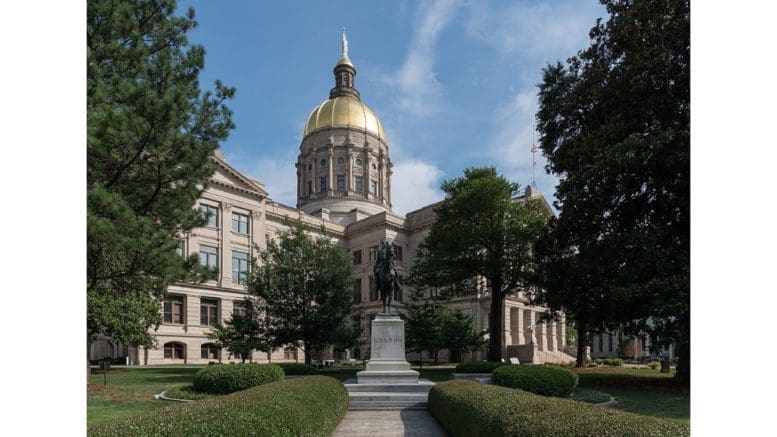by John McCosh, Georgia Recorder [This opinion article was first published in the Georgia Recorder, republished with permission]
March 18, 2022
We are closing out National Sunshine Week, a time when public officials are reminded to operate openly and transparently and embrace the spirit of the First Amendment. Georgia Republican Attorney General Chris Carr marked the occasion, pledging that his department is dedicated to enforcing the state’s Open Records Act and Open Meetings Act.
So, it is troubling that Georgia lawmakers are considering legislation as the 2022 General Assembly winds down that threatens some basic tenets of free speech and government accountability.
On Tuesday, state senators passed a bill sponsored by Cataula Republican Randy Robertson that amounts to legislative law-and-order backlash to 2020’s protests for racial justice. Included in Robertson’s Senate Bill 171 is an expanded definition of “unlawful assembly” that would escalate potential charges and penalties for protesters. The proposed law would also erode public employees’ free speech and due process rights, and inflict other damage to First Amendment protections for Georgians.
Georgia Recorder guest commentator Nora Benavidez recently explained in detail how Robertson’s proposal is a potential threat to anyone in the state who wants to speak up for what they believe in.
Robertson’s bill is one of several flagged in this year’s General Assembly by the Georgia First Amendment Foundation’s Legislative Watch list, an annual exercise by the state’s longtime, nonprofit government watchdog. I’m honored to have served on the foundation’s board for several years.
It would be the rare year when only one threat to open government or free speech gained traction in the Georgia General Assembly. And 2022 will not be that year.
One over-the-top proposal would amend the Georgia Open Records Act to prohibit the disclosure of otherwise public documents that simply contain the name of a government employee, even if their job or office isn’t disclosed. House Bill 573 means a deed to real estate owned by a government employee would no longer be publicly accessible, even though the name on a deed does not reveal occupation.
If you want to look up property records under the name of John McCosh and you’ve got a hunch which county I live in, it’s a pretty simple matter to look up the deed to my home. You can even get the sales history before I bought it and what the county thinks it’s worth.
The public is entitled to know if their public officials are buying and selling land, since many of those officials are privy to inside information about unannounced road projects and economic development deals that are shrouded in secrecy ahead of big announcements. One example is the $5 billion incentive-laden Rivian electric truck deal headed to a site east of Atlanta.
This broad and worrisome records-shielding bill did not survive Crossover Day Tuesday, but the language could reemerge as part of other legislation that did cross over. The smoothest path to ushering a bill into law through the Georgia Legislature is to get both chambers to vote for it by Crossover Day. But it’s also possible for frustrated sponsors to find a workaround by grafting the language onto a loosely associated piece of legislation that passes parliamentary muster.
A bill aimed at making it easier for Georgia parents to have books banned from their school libraries earned Republican support in a state House panel earlier in the 2022 session and is still alive to potentially reach the governor’s desk this year. The bill passed the Senate last year. So, if the House approves it as-is it could be ready for the governor to sign soon.
The governor signaled early in the 2022 legislative session he is looking for a chance to sign so-called Parental Bill of Rights bills. This one would require local school boards to create a complaint-resolution process that could lead to banning books from school libraries based on complaints submitted by parents or guardians that material is “harmful to minors.”
From the department of sauce for the goose is not good for the gander: Local government officials across Georgia are required to comply with the state’s open meeting and open record laws, as are state agencies. The Georgia Municipal Association and Association County Commissioners of Georgia both offer local elected officials continuing education at conferences to help local officials understand their obligation to operate transparently and retain government records.
You might think that state lawmakers who oversee a $30 billion government operation that dwarfs every local government budget in the state might need to obey those laws too. As local officials like to point out, it’s the state lawmakers making cities, counties and school boards comply with transparency laws.
But you’d be wrong if you thought those laws applied to state lawmakers. Members of the state House’s Democratic minority introduced a bill to bring state legislators under the Open Records Act and Open Meetings Act last year and it is technically still alive for this year. But it isn’t gaining many fans in the Legislature so far.
But it isn’t just state lawmakers who shrink from sunlight. State agencies that learned to livestream meetings during the past two years of a pandemic are suddenly holding meetings in person again while shutting down the virtual window into their work that provided access to Georgians from Bainbridge to Blue Ridge.
The phrase “sunlight is the best disinfectant” was introduced to American legal discourse by Justice Louise Brandeis, who served on the United States Supreme Court in the early 20th century. Georgia lawmakers still have time before the scheduled April 4 adjournment of the 2022 legislative session to let a little more sunshine in.
Georgia Recorder is part of States Newsroom, a network of news bureaus supported by grants and a coalition of donors as a 501c(3) public charity. Georgia Recorder maintains editorial independence. Contact Editor John McCosh for questions: info@georgiarecorder.com. Follow Georgia Recorder on Facebook and Twitter.
